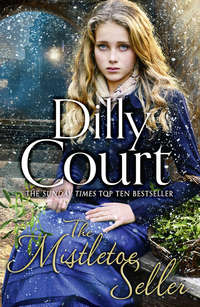
Полная версия
Nettie’s Secret
There had been no repeat of the impromptu party that had caught Nettie by surprise, but Aristide continued to be himself, getting up early to commune with the dawn – stark naked apart from his usual accessories – and working the barge with the expertise gained from a lifetime on the river. They had to put ashore frequently in order to barter for bread and fresh produce from small farms. Aristide knew all the farmers and smallholders by name, and everyone seemed delighted to see him. The women in particular greeted him warmly, and some of the children who came to stare at them might easily be related to the amorous bargee. Nettie wondered how he had managed to survive without a jealous husband or lover taking the law into his own hands, but Aristide seemed to be universally popular. Acting as a go-between, he passed on messages from one family to another, together with titbits of gossip that made the farmers’ wives curl up with laughter or fold their arms across their chests, pursing their lips and shaking their heads. Nettie and Byron always accompanied him on these visits, mainly to help carry whatever produce was on offer, and Nettie was eager to practise the French that Byron had taught her.
Life on the river was slow and leisurely, and the late spring weather seemed to add a touch of magic to the landscape. The sun sparkled on the water and birds sang in the trees, but the undercurrent of worry was never far from Nettie’s mind, and her only escape was getting lost in Belinda’s story. It had changed slightly in content, but her heroine had become like a second self, and the ancient castle where Belinda was held prisoner became Nettie’s retreat from the world. Belinda’s only way of communicating with the man she loved was a tame pigeon that flew in her window at night carrying a message from gallant Sebastian, who was an army officer fighting under the command of the Iron Duke. Nettie had to force herself to write slowly, even as her excitement grew with every twist and turn of the plot, and she tried to avoid crossings out, where possible. There had been vague praise for the novel that had been rejected, but a note in red ink had criticised Nettie’s presentation, and she was determined not the make the same mistake again.
When she finished writing she stowed the notebook and pencil behind the sack of flour they used for cooking, safe in the knowledge that none of the men would think of attempting to make bread – although Aristide did admit to having a go, apparently with disastrous results. Byron was useless in the kitchen and Robert could barely make a pot of tea, let alone attempt anything more ambitious. Nettie had never made bread, but pancakes were her speciality, which she served with the honey that one of the farmers had swapped for two bottles of red wine.
The hours of daylight lengthened, but Aristide showed no sign of urgency in getting his cargo to its destination. He seemed to enjoy having passengers on board, and as long as his belly was full and he had enough tobacco to smoke, and plenty of wine to drink, he did not complain. Robert’s career as creator of faked masterpieces had ended with the departure of Duke Dexter, and the longer he remained free from discovery the more confident Nettie became. Perhaps they had been granted a new start and maybe life on the river was for them. She could not speak for Byron, but she knew that he was still hoping to find his mother’s family and he questioned everyone he met, although with little success. Sometimes his hopes were raised by someone who said they remembered the Joubert family, but their memories were always vague and inconclusive.
Then, suddenly, everything changed when they reached Beauaire, a charming small town set beneath high chalky cliffs. Nettie was eager to go ashore and make enquiries about the château, which was clearly visible from the river, and Robert wanted to purchase more sketching pads and charcoal. Always on the lookout to earn money, he said he hoped to sell a few portraits. Nettie suspected that this would entail her father taking residence outside a convenient café so that he could drink wine while touting for business, and no doubt Aristide would join him. They made an odd couple, as different from each other as it was possible to be, and yet they had become good friends. They managed to converse using a mixture of sign language and odd words and phrases in French and English. To an onlooker it might appear like a comic double act, but Nettie knew that her father had found someone with whom he was completely at ease. Where they differed most was their attitude to women: Aristide was a philanderer, but Nettie had never known her father to show more than a professional interest in his female clients. She had realised as a child that he had suffered greatly when her mother died and had never looked to find a replacement for his lost love. For all his failings, Nettie would have loved him if only for his devotion to her dead mother, and to herself. Selfish, self-opinionated and easily led, Robert Carroll had a faithful heart, and to Nettie that meant everything. She knew she could never love a man who played her false.
Going ashore felt like a holiday, and, true to character, Aristide and Robert chose to take a seat outside the first café they came across in the marketplace. This left Nettie and Byron to explore the narrow cobbled streets, lined with half-timbered buildings, nestling beneath a turreted castle. Nettie felt as though she had gone back in time or had landed in the middle of a fairy tale. She would not have been surprised to see characters from much-loved children’s stories roaming freely amongst the burghers and their well-dressed wives, but what was even more astonishing was the small cobbler’s shop they discovered in a back street with the name JEAN JOUBERT in bold black letters above the door.
Nettie clutched Byron’s arm. ‘Do you think Monsieur Joubert is one of your relatives?’
‘There’s only one way to find out.’ Byron braced his shoulders and his knuckles whitened as he grasped the door handle.
‘Fingers crossed,’ Nettie whispered as she followed him into the dark interior. The smell of leather and glue was the first thing she noticed as she peered into the gloom, and then she saw a middle-aged man bent over a shoemaker’s last. He looked up, peering at them over the top of steel-rimmed spectacles.
Nettie held her breath while Byron tried to make himself understood. The older man seemed to be a little hard of hearing, and perhaps Byron’s accent was unfamiliar, but eventually the conversation became more animated, and Nettie was able to grasp a few words. It was only when the cobbler lifted the hatch in the counter and emerged to throw his arms around Byron that she was convinced that they had come to the right place.
Byron turned to her with tears in his eyes. ‘Nettie, this is my uncle Jean – my mother’s elder brother.’
Nettie bobbed a curtsey, which felt like the right thing to do in this town where dreams seemed to come true. ‘Bonjour, Monsieur.’ The words had barely left her lips when she found herself hugged against a leather apron, with Jean Joubert talking so fast that she could not keep up with the flow of rapid French.
He released her and hurried back behind the counter, where he opened a door and beckoned to them. Byron went first and Nettie followed him into a small parlour, which was crammed with furniture and bric-a-brac on every surface, reminding her forcibly of the cabin on Aristide’s barge. A kettle simmered on a small black-leaded range and Jean chattered volubly while he ground beans to make a pot of coffee.
‘What is he saying?’ Nettie asked in a low voice, during one of Jean’s rare pauses to catch his breath.
‘He is the only member of the family living in this town. He had to leave the river due to ill health.’ Byron’s eyes misted with emotion. ‘He’s been telling me about my mother, and why she left the barge and went to live in the city.’
Nettie thanked Jean as he handed her a steaming bowl of coffee. It was dark and bitter and she would have liked to ask for sugar, but she didn’t want to appear rude, and she sat quietly sipping the hot beverage. Byron and Jean were deep in conversation and she waited until there was a brief pause.
‘I think I should leave you to get to know your uncle,’ she said in a low voice. ‘You don’t need me here.’
‘I’m sorry, Nettie. We’ve been ignoring you.’
She rose to her feet, smiling apologetically at Jean. ‘Not at all. I think it’s wonderful that you’ve found your uncle. I’ll explore the town and I’ll meet you at the café where we left Pa and Aristide.’
‘Are you sure you’ll be all right on you own?’ Byron asked anxiously. ‘You’ve never been here before and you might lose your way.’
‘I’m sure I can manage without too much difficulty, and I need to find a haberdashery where I can buy needles and thread.’
‘All right,’ Byron said reluctantly. ‘But take care.’
‘I will. Don’t worry about me.’ Nettie smiled and leaned over to kiss his tanned cheek. She turned to Jean. ‘Au revoir, Monsieur.’ He responded in kind and Nettie made her way through the shop and let herself out into the street.
After the stuffy atmosphere of the parlour and the musty darkness of the shop, it was a pleasure to step into the sunshine and take deep breaths of fresh air.
Nettie set off in search of a shop that would stock what she needed, as her limited wardrobe had suffered during her time on board the barge, and now she had several tears to mend. In a sudden burst of generosity her father had given her some of the money that he had received for his sketches, and she might even treat herself to a ribbon or two. The prospect of shopping, even for something so simple, was exciting in itself, and as Nettie roamed the backstreets in the shadow of the great castle, she could imagine her novel’s heroine, Belinda, gazing out from one of the towers, unable to enjoy such freedom. Eventually she found a shop that sold what she wanted and she managed to make herself understood with the smattering of French that Byron had taught her. When she left the shop the tempting smell of hot bread wafted from a nearby bakery, making her mouth water, and, as she returned to the square she came across market stalls laden with fresh produce. It was midday and she was hungry. She quickened her pace as she headed for the café where she had left her father.
As she had expected, Robert was surrounded by curious townsfolk, who were watching intently as he completed a sketch of a plump, well-dressed matron. He held it up for the woman to see and she put her head on one side, squinting short-sightedly at the drawing. For a moment Nettie thought the subject of the portrait was going to criticise Robert’s efforts, but even at this distance Nettie could see that her father had flattered the sitter. Gone were the wrinkles around her thin lips, which he had made fuller, and he had erased the double chin. The woman in the portrait had a gentler, more pleasing and much younger appearance, and one of the onlookers began to clap, the others joining in. Madame rose majestically to her feet and took a purse from her reticule. She paid, if rather grudgingly, and marched off, clutching the likeness of herself as she might have looked a decade earlier.
Nettie made her way through the crowd and took a seat next to Aristide, who was smoking a cigarillo. On the table in front of him was a bottle of red wine and two glasses, one full and the other almost empty. He leaned forward to refill his glass, squinting through a spiral of tobacco smoke, but at that particular moment Robert leaped to his feet, tilting the table and sending the bottle crashing onto the cobblestones. A puddle of red wine spread from the broken glass like a pool of blood, and Aristide uttered a string of words that were not in Nettie’s vocabulary, although she did not need an interpreter to tell her that he was extremely displeased. But it was her father’s startled expression that made her turn her head, and she stood up, hardly able to believe her eyes.
Конец ознакомительного фрагмента.
Текст предоставлен ООО «ЛитРес».
Прочитайте эту книгу целиком, купив полную легальную версию на ЛитРес.
Безопасно оплатить книгу можно банковской картой Visa, MasterCard, Maestro, со счета мобильного телефона, с платежного терминала, в салоне МТС или Связной, через PayPal, WebMoney, Яндекс.Деньги, QIWI Кошелек, бонусными картами или другим удобным Вам способом.






